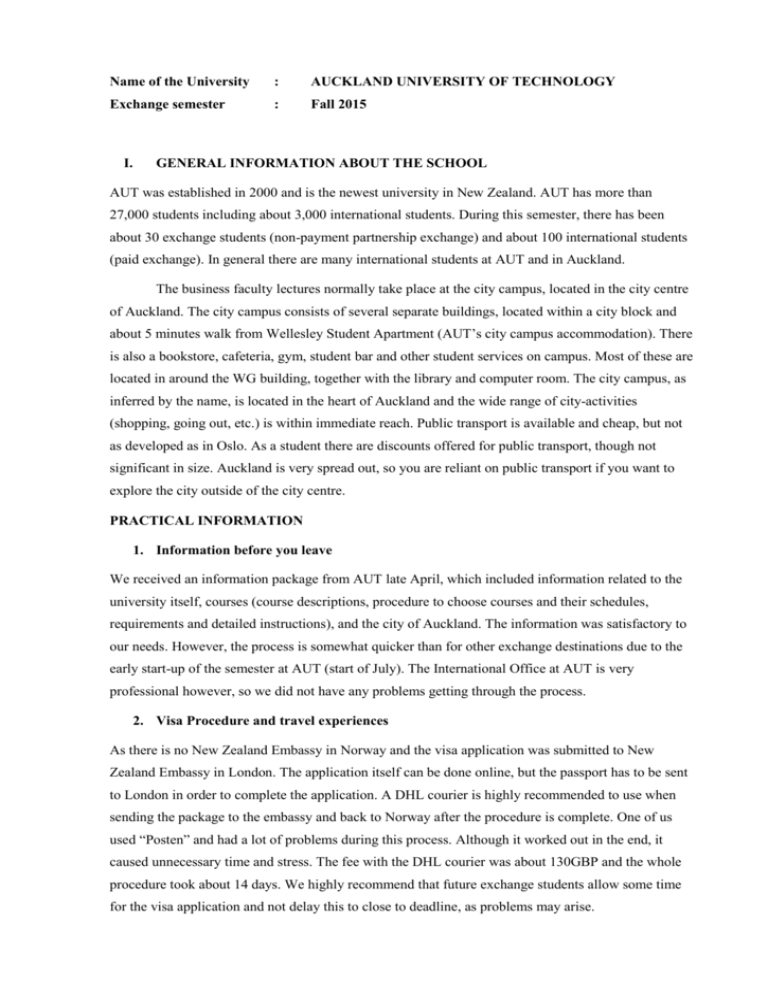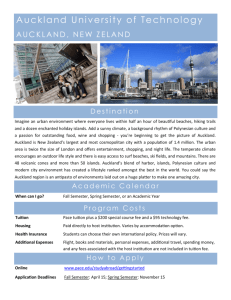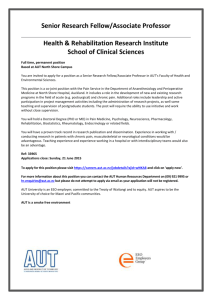AUT - Fall 2015 - BI Norwegian Business School
advertisement

Name of the University : AUCKLAND UNIVERSITY OF TECHNOLOGY Exchange semester : Fall 2015 I. GENERAL INFORMATION ABOUT THE SCHOOL AUT was established in 2000 and is the newest university in New Zealand. AUT has more than 27,000 students including about 3,000 international students. During this semester, there has been about 30 exchange students (non-payment partnership exchange) and about 100 international students (paid exchange). In general there are many international students at AUT and in Auckland. The business faculty lectures normally take place at the city campus, located in the city centre of Auckland. The city campus consists of several separate buildings, located within a city block and about 5 minutes walk from Wellesley Student Apartment (AUT’s city campus accommodation). There is also a bookstore, cafeteria, gym, student bar and other student services on campus. Most of these are located in around the WG building, together with the library and computer room. The city campus, as inferred by the name, is located in the heart of Auckland and the wide range of city-activities (shopping, going out, etc.) is within immediate reach. Public transport is available and cheap, but not as developed as in Oslo. As a student there are discounts offered for public transport, though not significant in size. Auckland is very spread out, so you are reliant on public transport if you want to explore the city outside of the city centre. PRACTICAL INFORMATION 1. Information before you leave We received an information package from AUT late April, which included information related to the university itself, courses (course descriptions, procedure to choose courses and their schedules, requirements and detailed instructions), and the city of Auckland. The information was satisfactory to our needs. However, the process is somewhat quicker than for other exchange destinations due to the early start-up of the semester at AUT (start of July). The International Office at AUT is very professional however, so we did not have any problems getting through the process. 2. Visa Procedure and travel experiences As there is no New Zealand Embassy in Norway and the visa application was submitted to New Zealand Embassy in London. The application itself can be done online, but the passport has to be sent to London in order to complete the application. A DHL courier is highly recommended to use when sending the package to the embassy and back to Norway after the procedure is complete. One of us used “Posten” and had a lot of problems during this process. Although it worked out in the end, it caused unnecessary time and stress. The fee with the DHL courier was about 130GBP and the whole procedure took about 14 days. We highly recommend that future exchange students allow some time for the visa application and not delay this to close to deadline, as problems may arise. One of us traveled one-way with Thai Airways via Bangkok, while the other with Emirates via Dubai. Although the flight is about 35-40 hours, it went by pretty fast without any problems. We can recommend both Thai Airways and Emirates for future exchange students. Neither of us had a return ticket, but we booked it well ahead of departure from Auckland without any problems. Money can be saved on buying a return ticket right away, but we wanted the flexibility of travelling after the semester at AUT. 3. Academic Calendar The fall semester at BI is the spring semester in New Zealand. The semester started with an introduction week on July 10th, while the actual first day of the semester was July 20st and ended early November (the last official semester end was 13th of November). The semester lasted for 12 weeks along with a two weeks of spring break. Most exchange students use spring break to either explore the South Island of New Zealand or travel to one of the pacific islands (Fiji, Samoa, Cook Islands, etc). We decided to visit Fiji for 10 days, which was quite relaxing and enjoyable. 4. Reception The International Office at AUT took care of the exchange students before and during the semester regarding all matters (transportation, accommodation, school’s regulations, student card, etc.). All details were well prepared and organized. There were initially separate first meetings right after we arrived to receive necessary documents and information, and a welcoming lunch for exchange students altogether. There were some free lunches at WG building for new students during the first week as well. Our experience with the international office was excellent. The school offers professional service and support, and are quite alert to the needs and wishes of their exchange students. 5. Housing We lived at Wellesley Student Apartment (WSA - University accommodation) and paid for 18 weeks at once at the beginning, as it was the cheapest option. The procedure was quick and the renting period was fixed, the office was very supportive in case students would like to move in earlier or move out later. The apartments were in reasonable condition, normally 5 rooms including fundamental kitchenware, microwave and fridge. There was also a Facebook page for the building’s residents and this was an unofficial communication channel between students and the staff of the accommodation. We found this very helpful. The building included a common lounge with LCD TV, a common study room with AUT-network desktops and used textbooks, a laundry room (3NZD/time) and a common kitchen. Living at WSA is more expensive than finding a private apartment for hire, but it is generally more convenient since everything is booked and paid for in advance. We highly recommend staying at WSA. The atmosphere and environment is really good for connecting with other exchange students. It is possible to rent privately, but this would make it much more difficult to engage with the international community at AUT as many of the activities and get-togethers are organized within the WSA environment. My impression is that rent is in very high demand in general in Auckland, so you should make sure that you have accommodation before you arrive. 6. Costs The costs of living is in general a little cheaper than in Norway. However, some basic items, like for example vegetables, can be quite expensive compared with Norway. Eating out is usually cheaper than in Norway, with the numerous sushi spots quite popular with students. School expenses consisted of books (prices quite similar to Norway), wireless Internet and printing. There was an option for secondhanded books at school’s bookstore and different Facebook groups. You get 10GB of free wireless Internet at AUT each month, and at WSA you get free Ethernet (internet with cable). This was sufficient for our needs. 7. Social Activities Since we lived at WSA, we had many opportunities to strengthen the relationship with other students. Different Facebook pages arranged activities such as short and long trips and social happenings both on and off campus. As most of the exchange students live in the same building, it was always easy to find something to do. We usually used the weekends for longer trips outside of Auckland to explore the North Island. 8. Cultural and Social Effects from the Exchange Experience Our cultural and social knowledge increased significantly while on exchange. It was especially great to be able to engage with the various cultures around AUT, including the Maori culture. We recommend that you participate in the Noho Marae, an event AUT offers to exchange students, where you learn about the Maori culture over a weekend. In addition to learning about the Maori culture, you always get to engage in cool activities such as international dinners and performing the world famous Haka! Many of the exchange students were from the USA, Denmark or Netherland. Nevertheless, you came across students from all over the world, as the international community at AUT is quite big. We both highly recommend that you take the chance to explore the country while you study in Auckland. New Zealand is by far the most spectacular country we have ever visited, with landscape and nature that will take your breath away. II. ACADEMIC INFORMATION 1. The Teaching situation Both of us undertook 4 courses at AUT. There are several courses to choose from and it really depends on which requirements are set by BI, as all courses must be approved by BI. The lectures are normally 2-hours long for master and 1,5-3 hours long for bachelor. Some of the courses started quite late in the day, sometimes as late as 7PM. The international office provides you with the timetables of the various courses when you are to select which courses to take, so you can make sure to avoid to take courses that run late if that is an issue. AUT has small classrooms with a capacity of approximately 30-40 students. Most of our classes however were quite small (the smallest class for one of us consisted of only four students). The teaching structure is different at AUT than at BI, as AUT has a more academic approach i.e. study based on academic articles and discussions. At masters level it is also not unusual to have many individual assignments throughout the semester instead of exams. Bachelor students usually have assignments, both in groups and individually, as well as an exam. Lecturers are generally supportive and respond to enquiries. They do however expect a certain level of engagement during class, since the classes are small and intimate. There is therefore an emphasis on preparation of study material before classes. Level of courses ranged within the bachelor and master courses, with bachelor level from 5-7 and master level from 8-9. We both experienced the general workload and level of study as somewhat easier than BI, as one would expect when on exchange. 2. Exams The grade scale is from C- (50% to pass) to A+. All courses at master and bachelor level consisted of individual and/or group assignments and presentations + small in-class tests. The exam period is somewhat shorter than at BI, and it is normal to end all of your exams within a week (including Saturdays). If you do not have any exams like I (master) did, your semester will usually end earlier than the official end of semester date. 3. Other As a student you get good instructions for assessing and using library resources as well as computer labs. Databases and other software were strongly recommended, particularly in assignments, and AUT offers free courses in how to use the different databases. Compulsory textbooks and other material were normally classified as “high demanded” and students were allowed to borrow these for up to a maximum of 2 days. Laptops were also for students to borrow, in 2-hour period. Group rooms were fewer than at BI. The informational system is somewhat more complicated than at BI, with several different web-sites. There were some free courses, which were extremely helpful for new students, such as Study Success, Academic English, Academic Writing, Critical Thinking Success, etc. There is a student support department, which helps students one-on-one and face-to-face, students are welcome to this department when they have specific questions or need general advice. 4. Description of Courses Courses taken at Master of Business (MBUS): Course Name - Code Prerequisites Note Introduction to research n/a Level 8 methods - MGMT 801 Considered moderately (Substitute for BI’s mandatory difficult methods course, at master of No exam, two individual hand- accountancy) ins each 50%. Course is useful for thesis writing as you cover basic knowledge concerning quantitative and qualitative methods. Sustainability accounting and n/a reporting – 368211 Level 8 Considered moderately (Substitute for BI’s mandatory difficult ethics course, at master of One in-class test, two accountancy) individual hand-ins and two presentations. Contemporary issues in n/a international accounting - Level 8 Considered moderately 368209 difficult In-class test every week to test knowledge of previous week’s material (relatively easy) + two hand in assignments. Sustainable Enterprise Strategies - SUSE801 n/a Level 8 Considered moderately difficult No exam, two individual handins. Courses taken at Bachelor of Business: Course Name - Code Prerequisites Note Operations n/a Level 6 – considered moderate Management 3-hour lecture (Substitute for BI's mandatory strategic 2 individual assignments 50% course) Exam (case analysis) 50% 466642 Corporate Finance n/a (Substitute to BI's Level 6 - considered difficult 2-hour lecture + 1-hour workshop mandatory economics course) Quiz (5% * 3) 15% 396002 1 group assignment 35% Exam (multiple choice + short answer) 50% Investment and n/a portfolio analysis Level 6 – considered moderate 1,5-hour lecture + 1,5-hour workshop 396003 Quiz (10% *2) 3 group assessments 30% Exam (multiple choice + short anwer) 50% Project Management 466650 n/a Level 6 – considered moderate 1,5-hour lecture + 1,5 hour workshop 4 group assignments 50% Exam (theory, case analysis, calculations) 50% From the bottom of out hears, we can both say that choosing to go to New Zealand for a semester without a doubt has been one of the best decisions we have made in our lives. We cannot recommend it highly enough! Feel free to contact the International Office for our contact information. We would love to share all great experiences from this amazing semester and offer other useful tips for living and exploring New Zealand.




